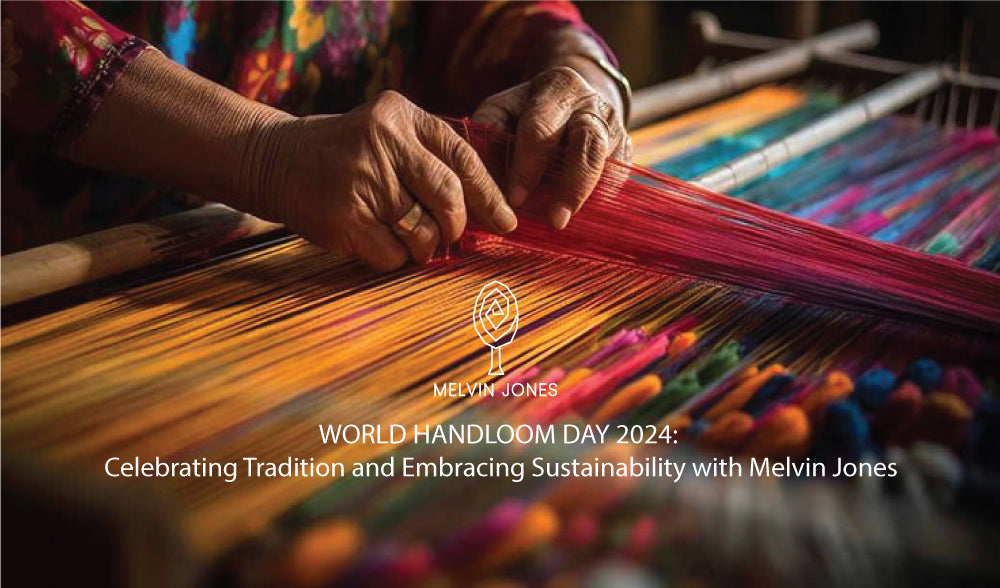World Handloom Day: Celebrating Tradition and Embracing Sustainability with Melvin Jones
On August 7th, World Handloom Day celebrates the rich tradition of handloom weaving and highlights the importance of sustainable and eco-friendly fashion. Melvin Jones is proud to honor this day by promoting natural clothing and supporting cotton farmers, underscoring our commitment to sustainability and responsible fashion.
The Significance of World Handloom Day
World Handloom Day commemorates the Swadeshi Movement, which began on August 7, 1905, encouraging the use of domestic products and the revival of local industries, including handloom weaving. Today, it serves as a reminder of the cultural and economic significance of handloom textiles, symbols of India’s rich heritage and craftsmanship.
Handloom textiles are unique, characterized by intricate patterns, vibrant colors, and high-quality fabrics. Each piece tells a story, reflecting the skill and creativity of the artisans who create them. Celebrating World Handloom Day recognizes these artisans and the role of handloom in promoting sustainable fashion.
Melvin Jones: Championing Natural Clothing
At Melvin Jones, fashion is both stylish and sustainable. Our commitment to natural clothing is central to our brand. We support cotton farmers, with 75% of our collection made from cotton. The remaining 25% features eco-friendly materials like linen, bamboo, sugarcane, and banana fabric. Each material is chosen to minimize our carbon footprint and promote sustainability.
- Cotton: Breathable, durable, and biodegradable, cotton is a widely used natural fiber. Supporting cotton farmers ensures our products are high-quality and planet-friendly.
- Linen: Made from flax, linen is strong and cool, requiring less water and pesticides than other crops, making it an eco-friendly clothing choice.
- Bamboo: Soft, moisture-wicking, and sustainable, bamboo grows quickly without pesticides, making it an excellent alternative to conventional textiles.
- Sugarcane: Sugarcane fibers create sustainable fabrics that are both soft and durable, reducing waste and promoting a circular economy.
- Banana Fabric: Banana fibers, a renewable resource, create biodegradable and eco-friendly fabric, offering a sustainable fashion option.
Supporting Cotton Farmers
Our sustainability commitment extends beyond materials. We support buying cotton and creating majority of collections from cotton. We believe this supports the cotton farmers. We buy Best quality cotton for the end consumer to create a range that seems highly fashionable. We have collections that are ideal for a party, brunch and regular weekend and workwear. Explore our unlimited collections, luxe club and extend series to embark an eco-friendly fashion journey.
Redefining Fashion with a Lower Carbon Footprint
At Melvin Jones, we believe fashion can be redefined by lowering our carbon footprint. By choosing natural fabrics and supporting sustainable practices, we are leading the way to an eco-friendlier fashion industry. Our collections are designed with the environment in mind, ensuring each piece is stylish and sustainable.
We encourage everyone to embark on a sustainable journey by making conscious fashion choices. By opting for natural clothing and supporting brands that prioritize sustainability, we can collectively reduce our environmental impact and promote a greener future.
Join Us in Celebrating World Handloom Day
This World Handloom Day, join Melvin Jones in celebrating the beauty and sustainability of handloom textiles. Let’s honor the artisans who create these masterpieces and embrace a journey towards a more sustainable fashion industry. Together, we can make a difference by supporting natural clothing and promoting a greener, more responsible way of living.
National Handloom Day Theme 2024
This year’s theme highlights the integration of technology and innovation in handloom weaving, fostering skill development and expanding market access for weavers. At Melvin Jones, we adapt a similar approach by incorporating unique fabrics made from fibers like eucalyptus, orange peel, and milk protein into our collections. We believe fashion doesn’t need to compromise with polluting polyester and plastic. The perils of these materials are seen in our landfills and riverbanks, yet fast fashion persists. Wear natural clothing—cotton, linen, and handloom. Practice "Buy Less, Buy Better." Let's redefine fashion by lowering our carbon footprint and embracing a sustainable future. Shop at www.melvinjones.in
